[ad_1]
A while back, we spoke about how scammers have been selling counterfeit stamps via Facebook ads. Thanks to our loyal reader Patrick K., we were able to investigate other Facebook ads selling fake products all for the purpose of stealing your money.
Let’s take a look at some of the most recent dangerous fake online ads to avoid.
1. Canon EOS Rebel T7 Camera fake ad
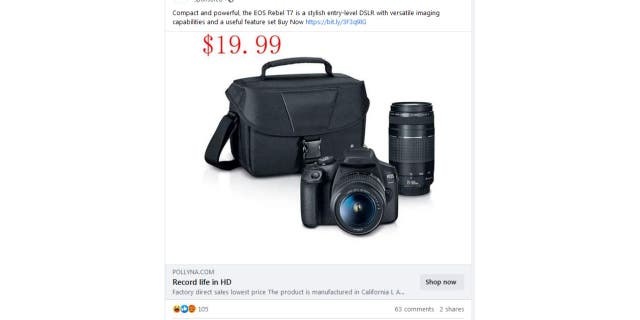
Canon EOS Rebel T7 Camera fake ad. ( )
This fake ad was posted to Facebook from a site called Pollyna.com. It listed a Canon EOS Rebel T7 Camera for just $19.99. We checked the price on Amazon, and it’s listed for $429. This is a classic example of a scammer trying to get you to click a link to a fake website and give away your credit card information for them to steal.
2. DeWalt 20V Max Drill Set fake ad
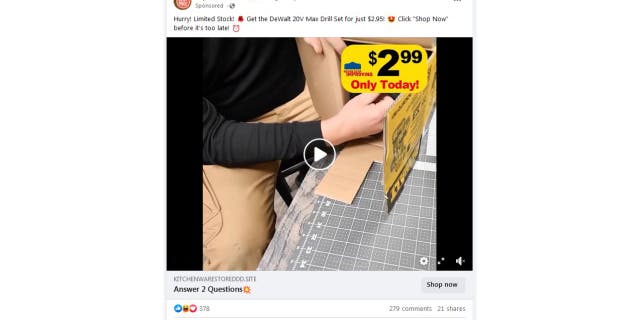
DeWalt 20V Max Drill Set fake ad. ( )
DeWalt is a popular company; have you ever seen them give away an entire drill set for $2.99?! That’s pretty much unheard of, and this is yet another example of a scammer trying to fool you. A real DeWalt drill set costs about $159. Notice how the link description says “kitchenwaresforeddd.site.” This is a clear sign that it’s fake because official sites do not typically use spelling like that.
3. HP Laptop fake ad
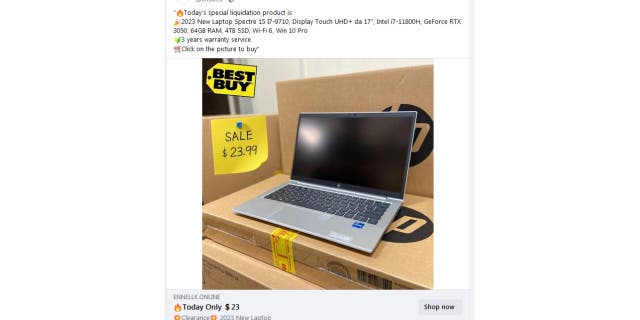
I’d love to see a legit retailer sell a brand-new laptop for only $23.99, however, it just isn’t realistic. These HP laptops (like most laptops) typically sell for well over $1,000. So if you see one anywhere being sold for significantly less than that (even if it’s an older model being resold), it’s probably a scam.
4. Hiseeu Wireless Security cameras fake ad
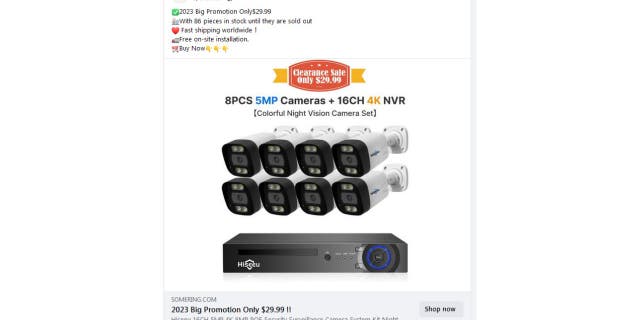
Hiseeu Wireless Security cameras fake ad. ( )
Getting just one security camera is expensive enough, and getting a whole system from Hiseeu is going to cost you at least $200. Far from the “bargain” offered here for $29.99. If it looks too good to be true, it probably is.
5. Tecovas Cowboy Boots fake ad
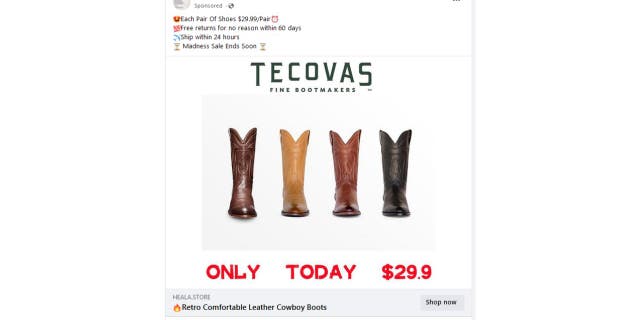
Tecovas Cowboy Boots fake ad. ( )
You might be able to find a nice pair of discounted boots at a store like Payless or Target, however, the Tecovas boots don’t usually have sales this good. We checked their website and the cheapest pair we saw cost $149, while most of the others were in the $200-$300 range.
FOR MORE OF MY TIPS, SUBSCRIBE TO MY FREE CYBERGUY REPORT NEWSLETTER BY HEADING TO CYBERGUY.COM/NEWSLETTER
Why does Facebook allow these fake ads on its site?
It’s not exactly that Facebook allows people to post fraudulent ads to the site. It’s more so that these scammers have found a way for their posts to avoid Facebook’s verification process altogether.
The way they do this is by buying accounts that have already gone through the verification process, such as business manager accounts that are allowed to post lots of ads. Once hackers take over these accounts, they can charge thousands of dollars in ad spending to credit cards associated with the compromised accounts and post whatever ads they want. So, it’s really a flaw within Facebook’s verification process that allows these ads to come to life.
How can I tell if an online store is fake?
1. Too good to be true
If you see an ad like this on Facebook, and it looks too good to be true, do not click the ad link. Instead, look at the company name of the product and go to their official website. If you see a great ad like that on the company’s verified website, then it’s your lucky day. However, it’s likely that the real product is being sold for much more than what that fake ad is offering.
WATCH OUT FOR ZELLE IMPOSTER SCAM ON FACEBOOK MARKETPLACE
2. Watch out for repeat letters or any other weird symbols
You should also check the URL at the bottom of each ad before clicking on it. If you notice in the examples above, some of the links said things like “ENNELLK.ONLINE” or “KITCHENWARESFOREDDD.SITE.” If you see repeat letters or any other weird symbols, then the site is probably a fake one. Also, if the URL starts with “https” instead of “http”, this indicates a secure connection, so make sure it always starts with “https.”
What if I accidentally fall for a fake Facebook ad?
If you think you’ve become the victim of a scam, contact the Better Business Bureau. You can file a complaint with the 24/7, and they can look into the fake Facebook ad for you.
Besides the BBB, you can also use IdentityTheft.org or call 877-438-4338 if you feel that your identity has been stolen or misused by you clicking or purchasing on one of these fake Facebook ads. Identity theft that has been made online can also be reported to the FBI’s Internet Crime Complaint Center.
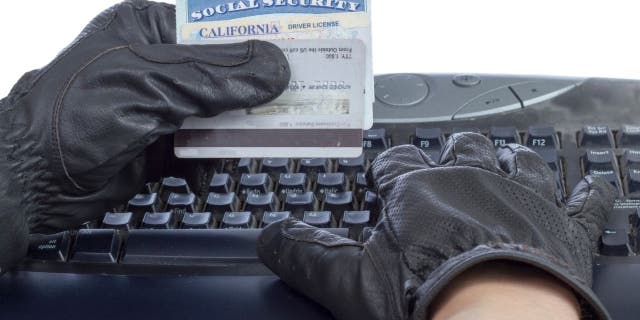
If you think you’ve become the victim of a scam, contact the Better Business Bureau. You can file a complaint with the 24/7, and they can look into the fake Facebook ad for you. ( )
How else can I protect myself?
Two other key steps you can take to protect yourself from these fake online Facebook ads are by using an identity theft protection service and having antivirus software on your devices. Here’s a breakdown of what each service can do for you.
Use Identity theft protection
If you want a service that will walk you through every step of the identity theft reporting and recovery process, you should consider an identity theft service.
Identity theft companies can monitor personal information like your Social Security number, phone number, and email address and alert you if it is being sold on the dark web or being used to open an account. They can also assist you in freezing your bank and credit card accounts to prevent further unauthorized use by criminals. The great part of an identity theft company like my #1 pick is that you’re provided with your own personal case manager that will help you recover any losses.
See my tips and best picks on how to protect yourself from identity theft by visiting CyberGuy.com/IdentityTheft.
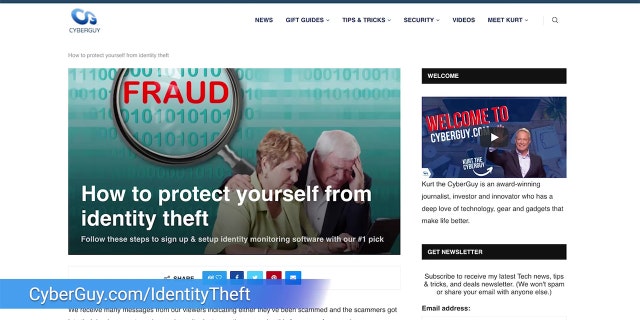
See my tips and best picks on how to protect yourself from identity theft by visiting CyberGuy.com/IdentityTheft. (Kurt Knutsson)
Have good antivirus software on all your devices
This story is also another reminder to always have good antivirus software running on your devices, as fake online store and ad scams entail asking the victim to click a link. Having antivirus software on your devices will make sure you are stopped from clicking on any potential malicious links that may be on your Facebook page.
See my expert review of the best antivirus protection for your Windows, Mac, Android and iOS devices by visiting CyberGuy.com/LockUpYourTech.
FREE ANTIVIRUS: SHOULD YOU USE IT?
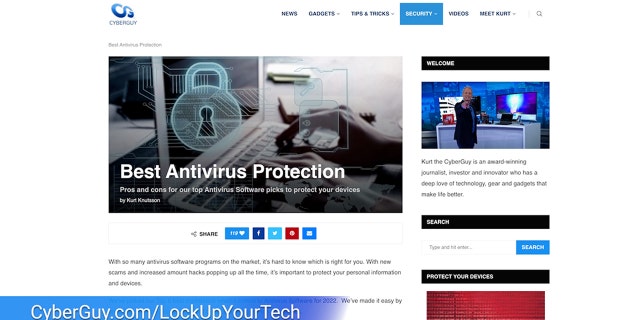
See my expert review of the best antivirus protection for your Windows, Mac, Android, and iOS devices by visiting CyberGuy.com/LockUpYourTech. (Kurt Knutsson)
Final Thoughts
When it comes to online shopping, remember that if a deal seems too good to be true, it probably is. Scammers are finding ways to sell counterfeit products via Facebook ads. Still, you can protect yourself by checking the company’s website, scrutinizing the ad’s URL, always being cautious about giving out your personal information, using an identity theft protection service and having antivirus software on your devices.
Have you seen any fake Facebook ads like this? Let us know by writing us at CyberGuy.com/Contact.
For more of my tips, subscribe to my free CyberGuy Report Newsletter by heading to CyberGuy.com/newsletter.
Copyright 2023 CyberGuy.com. All rights reserved.
[ad_2]
Source link

